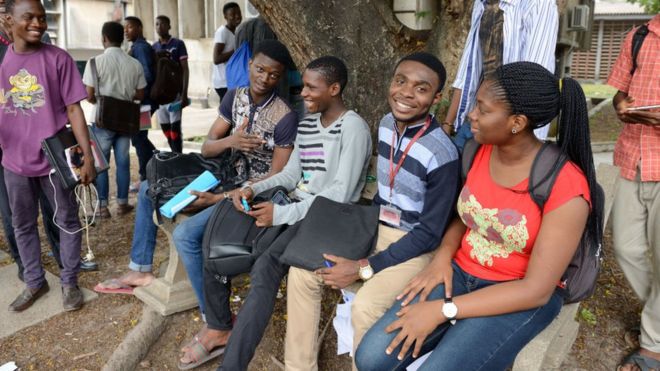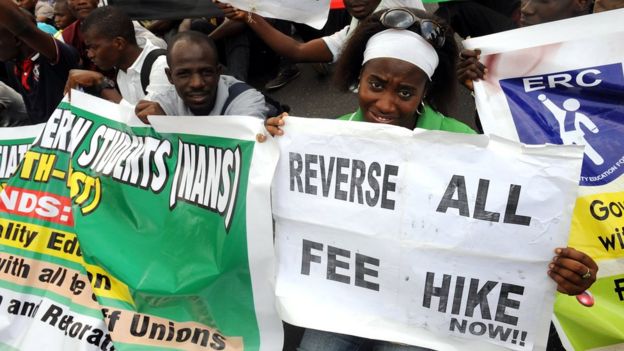
The futures of more than a million Nigerian university students are on hold as a lecturers' strike drags on less than a month before a presidential election, as Yemisi Adegoke reports from Lagos.
Olamide Tejuoso had been looking forward to the start of 2019.
She was expecting to be a fresh graduate beginning her career with a paid internship at a media company. The first step in realising her dream of becoming a writer after four years of studying at the University of Ibadan.
But instead of excitement, the communications student feels frustrated because of the ongoing strike by the Academic Staff Union of Universities (ASUU).
Students at Nigeria's state-funded universities have not resumed their studies due to an indefinite nationwide strike by academic staff that began in November.

The union has accused the government of failing to honour past agreements over the redevelopment of tertiary education.
They are also protesting about poor facilities, poor funding and an alleged plan to increase tuition fees.
There have been talks between the union and the government but negotiations are dragging on.
'Can't make plans'
Meanwhile, the future of Nigeria's 1.2 million federal university students is in limbo.
"It's depressing," says Ms Tejuoso. "As a final year student, you have all these plans, but you're not seeing the reality."
"I should have graduated last December, but because of this strike I'm limited. I can't do any major travel, I can't take any major job because I don't know when we're going to resume."
She now keeps herself occupied by writing and trying to work on her final project.
 AFP
AFP
Ms Tejuoso has also enrolled in a sewing class, but she is anxious and desperate to get back to university.
"We've had more than two months [of the strike] already and it's making the future look so bleak," she says.
"We don't know what's going to happen. Because of the elections, [resuming in] February is in doubt. We don't even know what the future holds for us."
ASUU president Biodun Ogunyemi, who himself has two children at public universities, says the strike is to secure the future of tertiary education, and ultimately the students' future.
'Restore dignity'
"We have always told our students and their parents what we're doing is in their own interests," Prof Ogunyemi says.
"We don't want them to earn certificates that will be worthless, we don't want them to get an education they can't be proud of, we want the restoration of the integrity of their certificates."
One of the major demands of the union is the implementation of past agreements and the spending of $2.7bn (£2.1bn) in total to revamp universities.
Annually, the government currently allocates about $1.8bn (£1.4bn) to the education sector overall, which accounts for 7% of federal government spending. Federal universities get nearly $750m of that.
But the lecturers say that it is not enough.
In a move to reassure striking workers, Employment Minister Chris Ngige said that the president was determined to "reposition our universities [and] will do everything possible to remove the present challenges".
This is the second strike since President Muhammadu Buhari came to power in 2015, but the tradition of the ASUU taking industrial action stretches back further than that.
Comments
Post a Comment